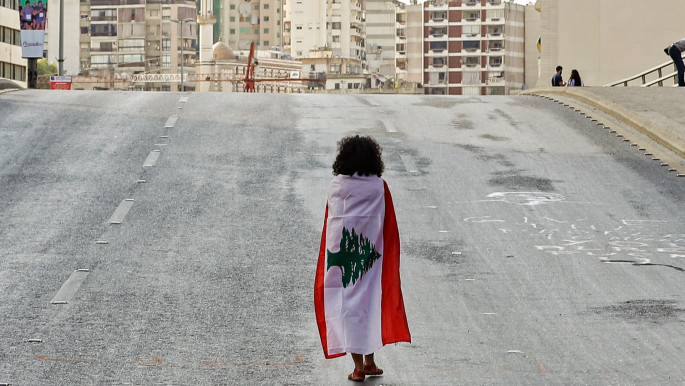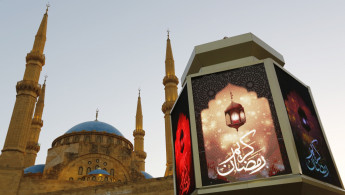Spiritual lockdown: Lebanon's Muslims prepare for a tough Ramadan, but there's a silver lining
Since the first case was recorded on 21 February, the number of confirmed cases in the small Mediterranean country has escalated to over 677, with 21 people dying from the virus.
With the Muslim holy month of Ramadan fast approaching, many have wondered what upcoming religious celebrations will look like, as mosques remain closed and large gatherings are forbidden.
"Like any normal day, I would go to work or university and help my mom in preparing food as well as make Ramadan sweets and juices like jallab or halawet el-jibn," Marwa Harb, a Sunni Muslim, told The New Arab, describing her usual Ramadan routine.
While waiting for the evening call to prayer to break the fast, she and her family would read the Quran or watch a TV series, before heading out to walk or go to a coffee shop. They would then wait for the mesaharati, or night caller, before eating for Suhoor.
"This year will be a little bit different because Ramadan is known for friends and family gatherings. This year everyone is far away due to coronavirus."
 |
Religious leaders from both the Sunni and Shia communities have faced mounting challenges about what to do for the upcoming holy month |  |
Muslims across Lebanon are now having to think about what they can do differently this year in order to celebrate Ramadan under lockdown, with a daily curfew between 7pm and 5am.
Nour Abdul Reda, a Shia Muslim, has also always observed a familiar Ramadan routine. "I would wake up around 12pm, pray, and read one part of the Quran. Since the Quran is 30 parts it's a Ramadan tradition to read one part every day and to dedicate it to a sick, dead or missing loved one," she told The New Arab.
Read more: How lockdowns are affecting Middle East domestic abuse victims
Abdul Reda's family would normally watch a TV series before Iftar, before washing the dishes and eating dessert together. She and her sisters would normally stay awake until Suhoor, and only sleep after morning prayers.
"Ramadan," Abdul Reda said, "is the only time I get to spend time with my family and the only time where we eat together because we're all working and all come home at different times".
 |
|
| Read more: 'We will rise again': Lebanon's revolution is on hold but far from over |
Religious leaders from both the Sunni and Shia communities have faced mounting challenges about what to do for the upcoming holy month, with uncertainty over whether the quarantine would continue or what health officials would recommend if it was extended.
"Even before Ramadan, we have been affected by mosques being closed, with people texting us to open them again," Dr. Hassan Moraib, the Assistant Inspector General of Lebanon's Dar Al-Fatwa, the Sunni Muslim governing body, told The New Arab.
"Mosques will definitely be closed to put health first so the infection doesn't keep going. The decision to close off the mosques isn't an easy one but we have to, and everyone's relationship with God can keep going inside the home because right now health is a priority," he added.
"I wish to see the virus gone and for it to stop spreading so life can go back to its normal way and mosques can open up again."
Youssef Khalil, a Shia sheikh and religious teacher, agrees with Moraib's sentiments that it is more important for people to stay home and be safe, rather than coming to the mosques for large gatherings.
Read more: Coronavirus pandemic: Positive stories of resilience and bravery
It is important for people to follow what medical professionals are recommending, he said, and staying home during Ramadan is an opportunity for people to practice their faith and values in a different way.
"Right now, we're focused on getting this disease out," Khalil told The New Arab. "We've been ordered to keep the mosques closed by scientists and people in the medical field who know more about health. And we stick to what the science says. If we need to stay home, then we stay home and if God wants us to be somewhere else, then we will be."
"Whoever is staying at home with his family, wife, husband, father, mother, then it's a chance for us to explain to our family members how to actually be generous and kind and find love inside all of us in this holy month," he added.
 |
With life slowing down due to the quarantine, many are viewing this Ramadan as an opportunity to get closer to their faith |  |
"I wish for everyone to look closely on serving God and how to serve him so he can lift all these pains and bring peace again. Hopefully this month will be the healing of health and of heart".
Despite the changes that they are going to have to make, Harb and Abdul Reda are both adamant that the coronavirus will not ruin the spirit of Ramadan.
While Harb acknowledges that things will have to be different, and that she will be restricted to calling her friends rather than spending time with them, she insists that she will continue to keep her traditions going.
"The spirit of Ramadan is not gone," she stated passionately, "but it's not the same. It's totally different from the years before because Ramadan is mainly based on family gatherings, going out with your family, praying."
"There's a special night during Ramadan where you meet with your family and friends and go to the mosque and pray until the morning. All of these things, we're not celebrating this year. I will still try to keep the Ramadan traditions and habits."
 |
|
| Read more: Will coronavirus cancel Ramadan? Five things to expect for this year's holy Muslim month |
"An important aim and message from Ramadan is not just about gatherings," Harb added, "but, also, trying to feel how they [the poor] suffer. We fast for around 16 hours with no food or water. But some families are suffering or staying without food, water or anything for days and months."
For Abdul Reda, the hardest thing will be not being able to see her extended family, specifically her aunt who usually comes from her home village to Beirut for Ramadan. She also is worried about Eid Al-Fitr, the celebration following the end of Ramadan, since Eid is all about being with your extended family.
Read more: Middle East art goes virtual amid coronavirus pandemic
"It feels scary and lonely," she said. "I wish we can postpone Ramadan for a couple of months," she added jokingly.
Moraib agreed that people should not meet for large gatherings during Ramadan celebrations and stressed that only people who live in the same home should be in close contact with one another, adding that the rich should help to make sure that the poor also can have meals.
"I'm calling on those who are rich or have money who used to do events to feed the poor to keep this act going by maybe providing free meals to their houses," he said.
 |
Everyone should try to help the less fortunate during these hard times |  |
"Everyone should try to help the less fortunate during these hard times."
Both Harb and Abdul Reda agree that people would do all that they can during this time to help the poor. Harb explained that people can donate money to places like Dar Al-Fatwa or organisations that work to help those in need.
Abdul Reda added that there are various groups in her community who, in the past, have worked together with local restaurants in order to make sure that everyone has food in front of them when they break their fast in the evening.
However, she said that she is not sure how this might work this year with all of the restrictions in place, ranging from the curfew and limited operating hours for many businesses, to the restrictions on cars being on the road.
 |
|
| Read more: Lebanese volunteers launch heroic effort to help health workers battle coronavirus |
"It might be a bit tricky and I don't know what they are going to do this year. I don't think that they are going to stop this, I just think that it won't be as convenient. Especially with the curfew and the odd and even number [license plate restrictions]. At FoodBlessed, an organisation that helps feed those in need, we used to do Iftars at refugee camps or at schools, at elderly shelters, at orphanages. This year we won't be able to do any of that".
With life slowing down due to the quarantine, Harb is viewing this Ramadan as an opportunity to get closer to her faith and to stick to traditions.
"For the last five years, Ramadan has been hectic because I used to work and study and fast, so, you can't do all of these religious things. But you should do them because it's only once a year. So, you should be closer to God and follow these traditions. This year I will definitely stick to them."
While also viewing this as an opportunity to put more focus on her faith, Abdul Reda sees this as a chance to rest and put more emphasis on her passions.
Read more: Coronavirus: Lebanon's LGBT+ community is locked down and unprotected
"Personally, I won't be coming to work for the month of Ramadan, so I'm hoping to rest. I'll only be writing for the961 and will start taking online creative writing courses because I'm interested in novel writing."
Even though Ramadan is an extremely important month for Muslims and the nationwide lockdown in Lebanon is set to end on 26 April, with the possibility of being extended, Harb urged people to remember what their religion teaches them and to stay at home despite how challenging it might be during this time.
"Our religion tells us to think about other people before ourselves," Harb said. "If we go to the mosque and we gather, then, maybe, I will harm other people. So I shouldn't do that. I should stay at home. I should think of my friends' health, my mom's health, my grandparents' health."
Nicholas Frakes is a freelance journalist who reports from London, the Middle East and North Africa.
Follow him on Twitter: @nicfrakesjourno



